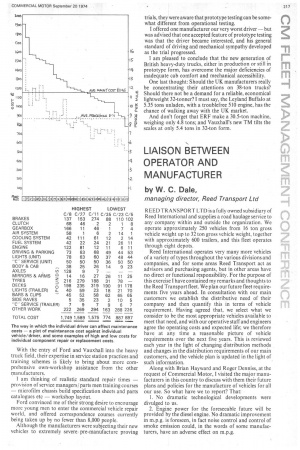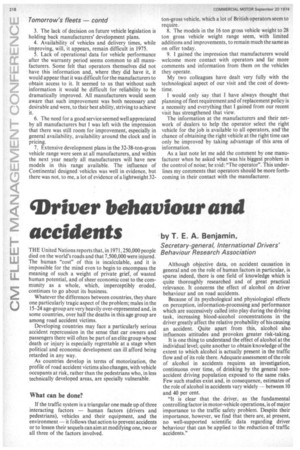LIAISON BETWEEN OPERATOR AND MANUFACTURER
Page 219

Page 220

If you've noticed an error in this article please click here to report it so we can fix it.
by W. C. Dale,
managing director, Reed Transport Ltd
REED TRANSPORT LTD is a fully owned subsidiary of Reed International and supplies a road haulage service to any company within and outside the organization. We operate approximately 250 vehicles from 16 ton gross vehicle weight up to 32 ton gross vehicle weight, together with approximately 600 trailers, and this fleet operates through eight depots.
Reed International operates very many more vehicles of a variety of types throughout the various divisions and companies, and for some areas Reed Transport act as advisors and purchasing agents, but in other areas have no direct or functional responsibility. For the purpose of this exercise I have contained my remarks and thoughts to the Reed Transport fleet. We plan our future fleet requirements five years ahead. In consultation with our main customers we establish the distributive need of their company and then quantify this in terms of vehicle requirement. Having agreed that, we select what we consider to be the most appropriate vehicles available to meet that need, and with our operative staff and engineers agree the operating costs and expected life; we therefore have at any time a reasonable picture of vehicle requirements over the next five years. This is reviewed each year in the light of changing distribution methods and changes in the distribution requirements of our main customers, and the vehicle plan is updated in the light of such information.
Along with Brian Hayward and Roger Denniss, at the request of Commercial Motor, I visited the major manufacturers in this country to discuss with them their future plans and policies for the manufacture of vehicles for all our use. So what have we to report? That: 1. No dramatic technological developments were divulged to us.
2. Engine power for the foreseeable future will be provided by the diesel engine. No dramatic improvement in m.p.g. is foreseen, in fact noise control and control of smoke emission could, in the words of some manufacturers, have an adverse effect on m.p.g. 3. The lack of decision on future vehicle legislation is holding back manufacturers' development plans.
4. Availability of vehicles and delivery times, while improving, will, it appears, remain difficult in 1975.
5. Lack of operational data for vehicle performance after the warranty period seems common to all manufacturers. Some felt that operators themselves did not • have this information and, where they did have it, it would appear that it was difficult for the manufacturers to obtain access to it. It seemed to us that without such information it would be difficult for reliability to be dramatically improved. All manufacturers would seem aware that such improvement was both necessary and desirable and were, to their best ability, striving to achieve it.
6. The need for a good service seemed well appreciated by all manufacturers but I was left with the impression that there was still room for improvement, especially in general availability, availability around the clock and in pricing.
7. Extensive development plans in the 32-38-ton-gross vehicle range were seen at all manufacturers, and within the next year nearly all manufacturers will have new models in this range available. The influence of Continental designed vehicles was well in evidence, but there was not, to me, a lot of evidence of a lightweight 32 ton-gross vehicle, which a lot of British operators seem to require.
8. The models in the 16 ton gross vehicle weight to 28 ton gross Vehicle weight range seem, with limited additions and improvements, to remain much the same as on offer today.
9. I gained the impression that manufacturers would welcome more contact with operators and far more comments and information from them on the vehicles they operate.
My two colleagues have dealt very fully with the technological aspect of our visit and the cost of downtime.
would only say that I have always thought that planning of fleet requirement and of replacement policy is a necessity and everything that 1 gained from our recent visit has strengthened that view.
The information at the manufacturers and their network of dealers to help the operator select the right vehicle for the job is available to all operators, and the chance of obtaining the right vehicle at the right time can only be improved by taking advantage of this area of information.
As a last note let me add the comment by one manufacturer when he asked what was his biggest problem in the control of noise; he slid: "The operator". This underlines my comments that operators should be more forthcoming in their contact with the manufacturer.




































































































































































































































































































































































